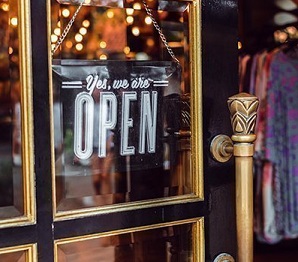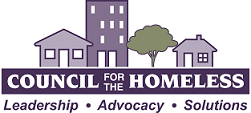

- Make eye contact and talk kindly to people who are without homes.
- Leave a message or send an email to our Coordinated Outreach Team: 360-450-0802 or outreach@councilforthehomeless.org. Replies within 24-48 business hours. For more information visit Outreach Staff.
- Contact the City of Vancouver’s Homeless Assistance and Resource Team (HART). hartteam@cityofvancouver.us or 360-487-8626
- If someone is being disruptive, homeless or not, try to de-escalate the situation if comfortable.
- If someone is threatening harm to self or others, acting recklessly or violently, or having delusions, call the SW WA Crisis Line: 800-626-8137. Or call 911 and ask for a mental health trained officer.
- Install good lighting around your building; lock or turn off exterior power outlets.
- Let people know your boundaries on your property. If people are doing something illegal and won’t leave, call the non-emergency police line: 311 or 911.
- Keep the area in front of the business clean and well maintained. Keeping your area clean encourages others to respect the area.

- Assume people know your expectations.
- Offer food or money, unless you are equipped and willing to handle repeat requests.
- Permit anyone to camp on your property, unless you have developed a trusting relationship with them.
- Permit anyone to store shopping carts or personal belongings on your property.

Homelessness touches all parts of Clark County.
Here’s what to do if:
Someone is sleeping/loitering at your front door:
- Odds are, this won’t be a one-off interaction, so it’s good to establish a friendly relationship. Introduce yourself. Ask for the person’s name.
- Politely ask them to leave using sincere empathetic language that deflects the request from yourself to a third party (e.g. the property owner asks them to leave, even if that person is you). This reduces the power-dynamic, and will help in future interactions.
- Let them know where they can be, as opposed to only where they cannot be.
- If they are not cooperative, tell them you are going to call the police, but would rather not. Avoid confrontation and keep a safe distance if you feel threatened in any way. Call community homelessness outreach team first, then the non-emergency police line 311, and if they become disruptive or dangerous call 911.

Someone exhibiting disruptive mental health symptoms has walked into the business:
- If they purchase something, treat them like any other customer. This sets a great example for your employees and patrons. If they do not make a purchase, let them know this area is for customers, and politely ask them to leave, only if you would do the same for a non-paying patron who is not homeless.
- If they are symptomatic and disruptive: Ask them to leave clearly and politely. Your safety, and the safety of your patrons is your priority. If they remain in the facility call the mobile crisis line first, then the non-emergency police line 311. Based on the situation, you may want to call 911 if the situation feels dangerous.
Quick Connect: WHO TO CONTACT
- 360-695-9677: Clark County Housing Hotline
- 800.626.8137: Mobile Crisis Line for those who are highly symptomatic
- 360-450-0802 or outreach@councilforthehomeless.org: Coordinated Outreach Team
- hartteam@cityofvancouver.us or 360-487-8626: City of Vancouver’s Homeless Assistance and Research Team
- 311 – For non-life threatening concerns
- 911 – For life threatening or safety concerns
-Get to know the people living on the streets in your area and treat them like any neighbor.
-Encourage/help them call public services like 211 and the Clark County Housing Hotline: 360-695-9677.
-Leave a message or send an email to our Coordinated Outreach Team: 360-450-0802 or outreach@councilforthehomeless.org. Replies within 24-48 business hours. For more information visit Outreach Staff.
-Share the Council for the Homeless Resource Guide
-In the winter call the Winter Shelter Housing Hotline: 360-695-9677
-Many organizations directly help people experiencing homelessness and work to increase affordable housing. One thing you can do as a business is find an organization that you want to support, and ask them what they need.
-Clark County’s homeless service providers know how to help our homeless neighbors. It’s what they are best at. The more you support them, the more they can help people get off the streets and into stable housing.
-Avoid perpetuating stereotypes, stigma and myths. People experiencing homelessness are not defined by their housing status. It’s often temporary, and it’s likely they’ve sought housing and/or shelter and there was none available.
-Advocate within your circle of influence to help make things better for our neighbors who are homeless. This will help our business community too.
Point in Time Count: Annual count of people living outside. Critical to allocating resources and provides consistent comparison of trends.
Community Services: https://www.clark.wa.gov/community-services
Advocacy: Sign up for our advocacy list HERE. Participate in Housing Homelessness Advocacy Day each year.
Youth Mentorship: Young people need caring adults in their lives. Become a mentor. Big Brothers Big Sisters Columbia Northwest , Boys Girls Clubs of Southwest Washington, Great Life Mentoring.
Housing: Talk to landlords you know about accepting housing vouchers and applicants that may typically have a harder time being accepted into housing. Let them know about the Landlord Mitigation Fund.
Job Training: Work with agencies that train people who have experienced homelessness for new careers like PIC and WorkSource Southwest Washington.
Mental Health Resources: NAMI of Southwest Washington Columbia River Mental Health Services
Thank you to the businesses who helped make this toolkit possible!

Don’t forget!

Would you like to download the Clark County Business Toolkit on Homelessness? CLICK HERE
